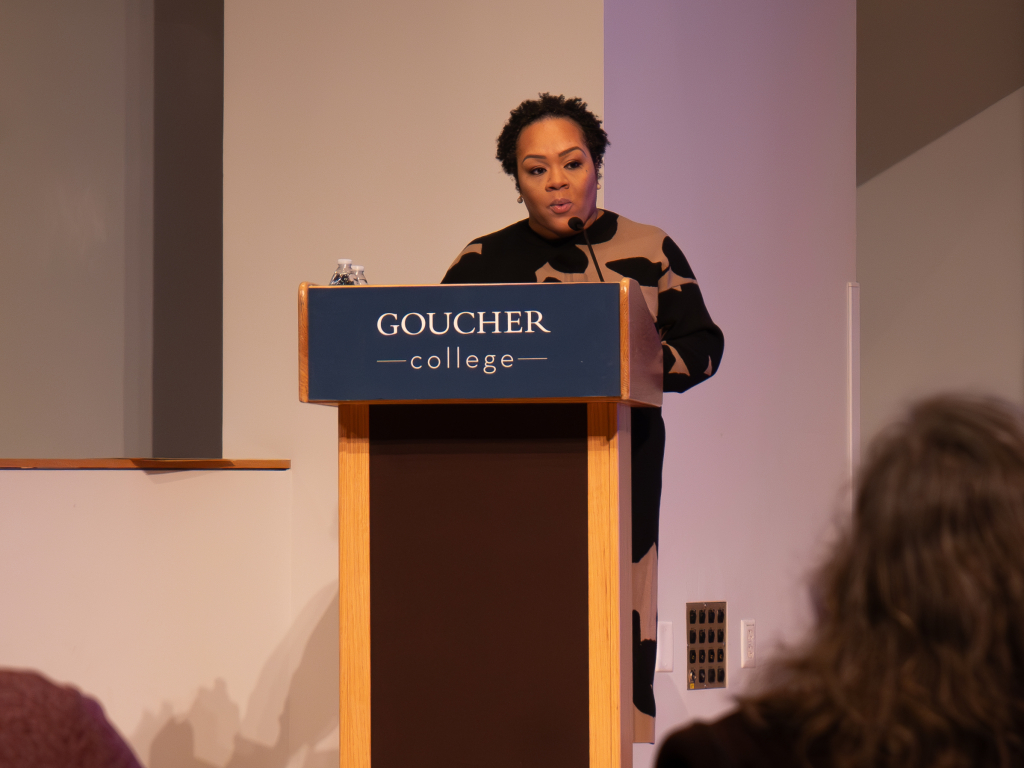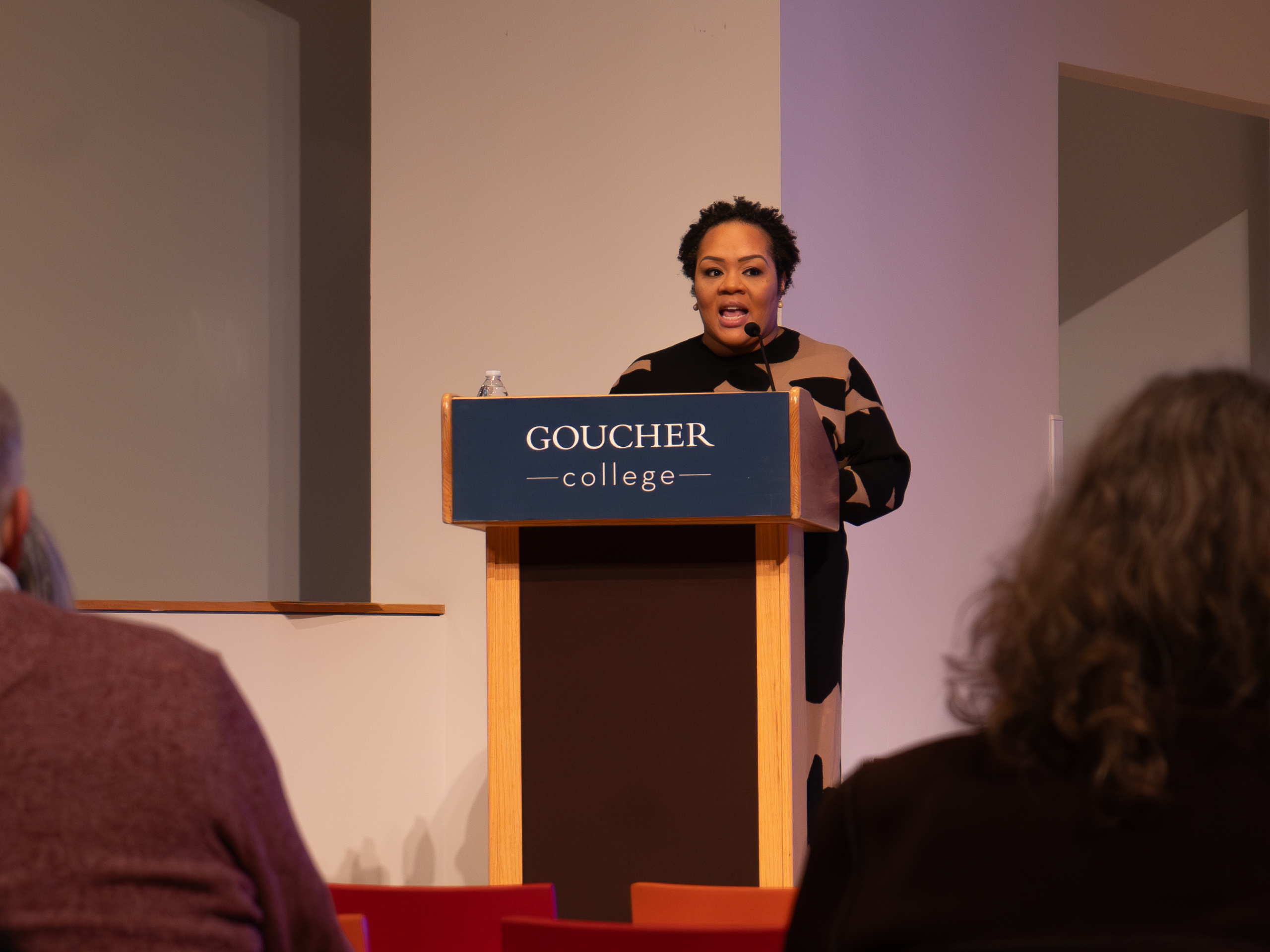“In today’s ever-changing political landscape, Yamiche Alcindor has become a go-to voice for covering issues that affect Democrats and Republicans alike.”
Jasmine Lee, Vice President for Equity and Inclusive Excellence
Those were the opening remarks given by Jasmine Lee, Vice President for Equity and Inclusive Excellence, ahead of Alcindor’s Roszel C. Thomsen Lecture on the second-to-last day of Black History Month.
Indeed, Alcindor has proven herself more than worthy of that description. The daughter of Haitian immigrants, she made a name for herself as the White House Correspondent for PBS Newshour, covering the Trump administration and the impact of its policies around the globe, from the summit with Vladimir Putin in Helsinki, to domestic settings such as the Texas border and Jackson, Mississippi.
In 2020, she hosted the sixth debate of the Democratic Presidential Primary, and was named Journalist of the Year by the National Association of Black Journalists. She was also the host of PBS’ Washington Week from 2021-2023, and currently serves as a political contributor at NBC News and MSNBC.
Alcindor opened her remarks by reading from “I’ve Been To The Mountaintop”, Martin Luther King Jr’s final speech, in which he said that, even if he could choose the time in which he lived, he would still live in the same era. She opined that MLK would also choose to live in 2024, another year marred by inequality and political upheaval, and reflected that, “this period is forcing us to look at every aspect of our nation, what kind of country we want to be, and whether we want to have a country at all.”
She then turned to one of her great inspirations: Mamie Till, a Civil Rights activist and mother of Emmett Till. She described how, after learning about the story of Emmett Till’s murder, she wanted to be in the shoes of the journalists who shared his story and helped kickstart the Civil Rights Movement. She told of how she was inspired by her single mother, a social worker who came to America at just 22 years old, and noted how from a young age, she was asking questions about how different her education was from that of her white peers.
Alcindor then described how she began her journalism career by interning at a small African-American community paper in her hometown of Miami. After several more internships, she joined the staff of USA Today in 2011 and wrote about the plight of people living in inner cities. The most profound event in her experience as a journalist came a few years later, when she was reporting on the birth of the Black Lives Matter movement in Ferguson, Missouri, and thought back to the reporters of the Civil Rights era.

Referencing how she was frequently insulted by Trump during his presidency, Alcindor said that all journalists, especially marginalized ones, will encounter great adversity, but must always press forward. Additionally, she said that despite the multitude of chaotic, unprecedented events going on at the same time, it is everyone’s duty to reach out to people with vastly different experiences from them. However, she will never separate herself from the fact that the core of her journalism is that racism is wrong and people should be treated equally. Alcindor ended her speech by thanking Dr. King, and mentioning how she and her husband met at the MLK Memorial while attending an event for Black journalists.
Afterward, there was a period for audience questions. One student, a native of St. Louis who was in 6th grade during the Ferguson protests, asked what Alcindor learned from reporting at the time. Alcindor replied that she learned the importance of diversity in newsrooms, which she believes always makes coverage stronger. She also learned how easy it is to have constitutional rights stepped on, referencing that in Ferguson, protestors had to be moving all the time when on public streets
Another student asked Alcindor what the piece she’s most proud of was. She referenced a story where in Michigan, during the 2022 midterms, she met a Republican woman who went to an abortion clinic, decided to have the child, but at the same time changed her stance on the issue and decided that she couldn’t deny a woman the choice. She also referenced a New York Times article about a hospital that piloted a program where they gave housing to their patients, and how it saved the lives of at least one homeless man.
Lee asked the final question, asking what Alcindor would write for an op-ed she knew would be her last, referencing a similar op-ed written by Congressman and Civil Rights legend John Lewis shortly before his death. Alcindor, although slightly unnerved by the question, said that the most courageous thing one can do is tell the truth, and that for America to survive, we all need to listen to one another and “decide how we use our God-given talents to bend the arc [of justice].”

